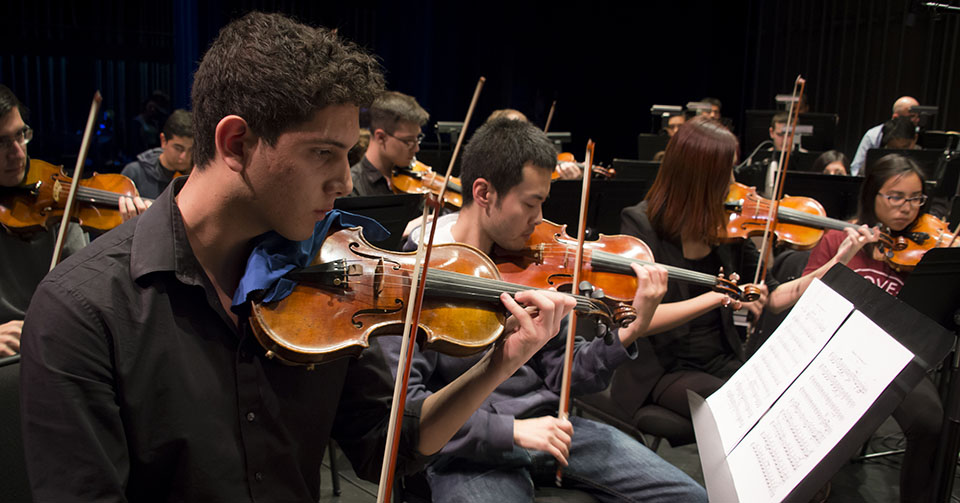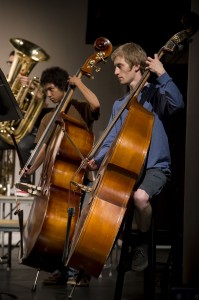CSUN’s Acclaimed Department of Music Stays True to the Classics

California State University, Northridge student musicians rehearse with the CSUN Symphony. Photo by Lee Choo.
In an era when pop, hip-hop and technology dominate the music world, California State University, Northridge is holding fast to its classical roots. At nearly 60 years old, its venerable Department of Music has graduated thousands of classical musicians, and CSUN alumni are playing in orchestras, holding faculty positions and teaching music in private practice all over the world.
The music department has diversified and branched out in recent decades, adding Music Industry Studies, Media Composition and other popular disciplines, but the bachelor’s and master’s degree programs in piano performance, strings, winds, guitar, percussion, opera and other vocal studies remain extremely popular. Students are drawn to CSUN’s music program for the same reasons that attracted their predecessors in the 1960s, ’70s and beyond: the high caliber of faculty — and the relative accessibility of those faculty mentors to all students.
“The department is really transitioning, and it’s like a dual training ground,” said Ron Borczon, chair of the Department of Music, a classical guitarist who has taught at CSUN since 1984. “Decades ago, this place was like a conservatory, churning out composers and performers. There were no degrees back then in commercial media composition or music industry — those types of degrees did not exist. The fame of the department was built on the conservatory style. However, now the fame of the department also includes these newer degrees.”
Faculty Stars, Down to Earth
CSUN music faculty, for all their accomplishments, are not on the road touring and unavailable most of the year. They’re in Cypress Hall on campus, working closely with students.
“In every faculty area, we have a star — in piano, clarinet, voice, guitar, strings, in every area,” said Borczon, who also heads the department’s Music Therapy Program. “When you have stars in every area, students are going to come for them.”
Clarinetist Julia Heinen, pianist Dmitry Rachmanov, violinist Lorenz Gamma and guitarist Steve Thachuk are just four examples of faculty who perform nationally and internationally.
“One of the great things about our music program is that we have a star factor, but the stars are not gone, missing tons of lessons,” Borczon continued. “Here, all our teachers are dedicated to giving the students all their lessons. We are so student-oriented, and so focused on student success.”
Students Make Their Mark

California State University, Northridge student musicians rehearse with the CSUN Symphony. Photo by Lee Choo.
In their first two years at CSUN, all music undergraduates must take core classes such as music theory and piano skills. Then, in their junior year, students focus on an area of specialization such as vocal arts or orchestral strings performance for the Bachelor of Music, or music education and music therapy for the Bachelor of Arts. The department also offers a Master of Arts and a Master of Music in a number of disciplines.
“We have vocalists who are winning Met auditions. We have violinists who are winning major competitions, and so many of our students are going on to major graduate schools, doctoral programs and performing in orchestras,” Borczon said. “The traditional core music program is still succeeding.”
In mid-February, the CSUN student chapter of the National Association for Music Education was named the Collegiate Student Chapter of the Year at a gala awards banquet as part of the California All-State Music Education Conference. The accolade marked the fourth time CSUN has received the award, an unprecedented achievement in California.
This semester, the CSUN Wind Ensemble has been invited to perform in Hawaii. The Women’s Chorale has toured and performed in China. And the acclaimed Jazz Studies Program regularly wins honors and invitations to prestigious festivals, including recent invitations for the CSUN Jazz Combo, Kairos, to compete at the Monterey “Next Generation” Jazz Festival, and a win at the Angel City Jazz Festival Young Artist Competition. Later this spring, the CSUN Jazz Band is invited to record student compositions at Capitol Records recording studio in Hollywood, said music professor Matt Harris, head of the Jazz Studies Program.
In fall 2017, violin seniors Madeleine Hogue and Sophia Schuldt joined the American Youth Symphony after winning its most recent audition. The pair of violinists are two perfect examples of the legacy of thousands of CSUN students and alumni who have become active members of the Los Angeles area music community.
“We have a lot of diversity in our student population — and whenever you have diversity, you have learning,” Borczon said. “Music is a solo activity that needs companionship in ensembles. Think about what it’s like if you’re a flute player [in an ensemble], and the flute player next to you is from Korea. And the flute players next to them are from Japan, the Middle East and Mexico — and here because of DACA.”
Flute performance graduate student Anna Martone ’17 (Music) said she chose to study music at CSUN due to its proximity to her hometown of Thousand Oaks, as well as encouragement from her older brother, alumnus and classical percussionist Joe Martone ’12 (Music). As a high school student, she visited the Department of Music and took a lesson with flute professor Sandra Kipp Iles, with whom she immediately bonded, Martone said.
“I have really appreciated the music department. It’s competitive and you have to work hard, but there are so many nice people here,” Martone said. “The faculty are so helpful — that’s one of the biggest reasons I decided to stay to get my master’s degree here. They’re very accessible. I feel so at home here, and I enjoy how it feels like a family.
“CSUN is also a great school because you’re not put in one box,” she said. “I’m a classical flute player, but I’ve also gotten to play with the jazz band and in composers’ recitals. You can dip your feet in different pools.”
Professional Guidance
Many alumni return to teach as CSUN faculty, including Kipp Iles ’90 (Music), M.M. ’94 (Music); professor Gary Pratt ’80 (Music), a professional jazz musician who has taught in the department for more than 30 years; and beloved piano professor Edward Francis ’77 (Music), M.A. ’79 (Music), who passed away in 2017.
“One of the strengths of this department has always been the fact that students study with a full-time professor,” said emeritus professor William Toutant, whose tenure at CSUN stretched from 1975 until he retired in 2013. In addition to teaching theory, composition and musical analysis, Toutant served as dean and associate dean of what is now the Mike Curb College of Arts, Media, and Communication.
“If you’re studying composition, in many other places, your first harmony course would be taught by a graduate assistant,” Toutant said. “Here, you study with a full-time professor. By the time you get to studying counterpoint, you might have as your teacher [professor emeritus] Aurelio de la Vega, who is probably the foremost Latin American composer in the world. Here you are, an undergraduate studying with someone of that stature!”
The department was small but well regarded by the late 1960s. It experienced its greatest growth — in faculty numbers and student population — starting in 1970, said emeritus professor Daniel Kessner, who taught and headed the composition program from 1970 until he retired in 2005. From the 1970s, Kessner said, the department built on its reputation and garnered wide-spread acclaim as its graduates performed around the globe and taught students of their own.
Emerita professor Françoise Régnat, who taught piano at CSUN from 1972-2010, emphasized the importance of continuing to nurture a vibrant classical music core in the department — including a strong orchestra, piano, strings, vocalists and winds.
“You have to have strong classical music in the department,” Régnat said. “Classical music should be the main area, and music must be performed.”
Kessner remains close with his CSUN music colleagues and former students, and he said he’s proud of the stellar reputation the Department of Music has built over nearly 60 years, graduating thousands of musicians. “Every time one of our students succeeds and goes on to do something great, we all feel wonderful,” he said.
“For me,” he added, “it was the joy of performing and bringing up the next generation of students.”

 experience
experience